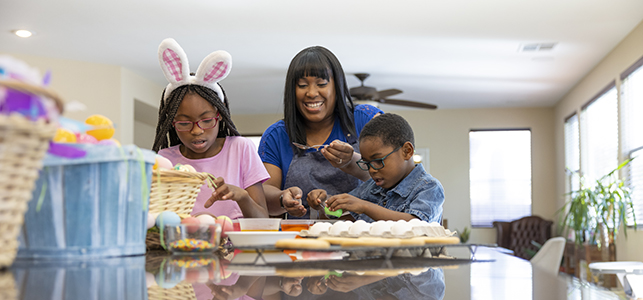6 Easter egg safety tips from the Virginia Poison Center
April 04, 2022

6 Easter egg safety tips from the Virginia Poison Center
Spring brings opportunities for fun times and fresh starts. Last year, we highlighted the poison risks associated with spring cleaning, but springtime soirees can present dangers too. If your family celebrates Easter, our Virginia Poison Center has some safety tips for one of the holiday’s most popular foods – eggs!
The Virginia Poison Center’s tips for preventing food poisoning
- Shopping for fresh eggs
When shopping for eggs, open the carton and check that they’re clean and intact. Dangerous bacteria can enter if they are cracked.
- Washing your hands
It’s important to wash your hands before and after handling eggs. If kids are helping, they need to wash them too.
- Dyeing your eggs
Make sure to use only food safe dyes. Supervise children if they’re helping with this task. It’s not uncommon for kids to confuse dye tablets for candy. Don’t panic if a child eats a tablet but call the Poison Center right away.
- Eating eggs
If you plan to eat the eggs you used for your egg hunt, you want to do so within two hours. If there are cracks or the eggs have been in contact with animals, it’s best not to eat them. A safer alternative is to use fake eggs for the hunt and leave the real ones for eating.
- Storing eggs
When storing eggs make sure they go inside the fridge, not the fridge door. They should be refrigerated at 40°F or colder within two hours of cooking. Once hard-cooked, refrigerated eggs can be stored for up to one week.
- Preventing cross contamination
Wash your hands after handling eggs, especially if you handled raw eggs. Make sure to clean all surfaces that were in contact with raw eggs – utensils, countertops, etc. This includes any spills in the refrigerator too. Many pathogens can live in extremely cold temperatures. The cold merely slows bacterial growth.
Have fun and stay safe this spring!
